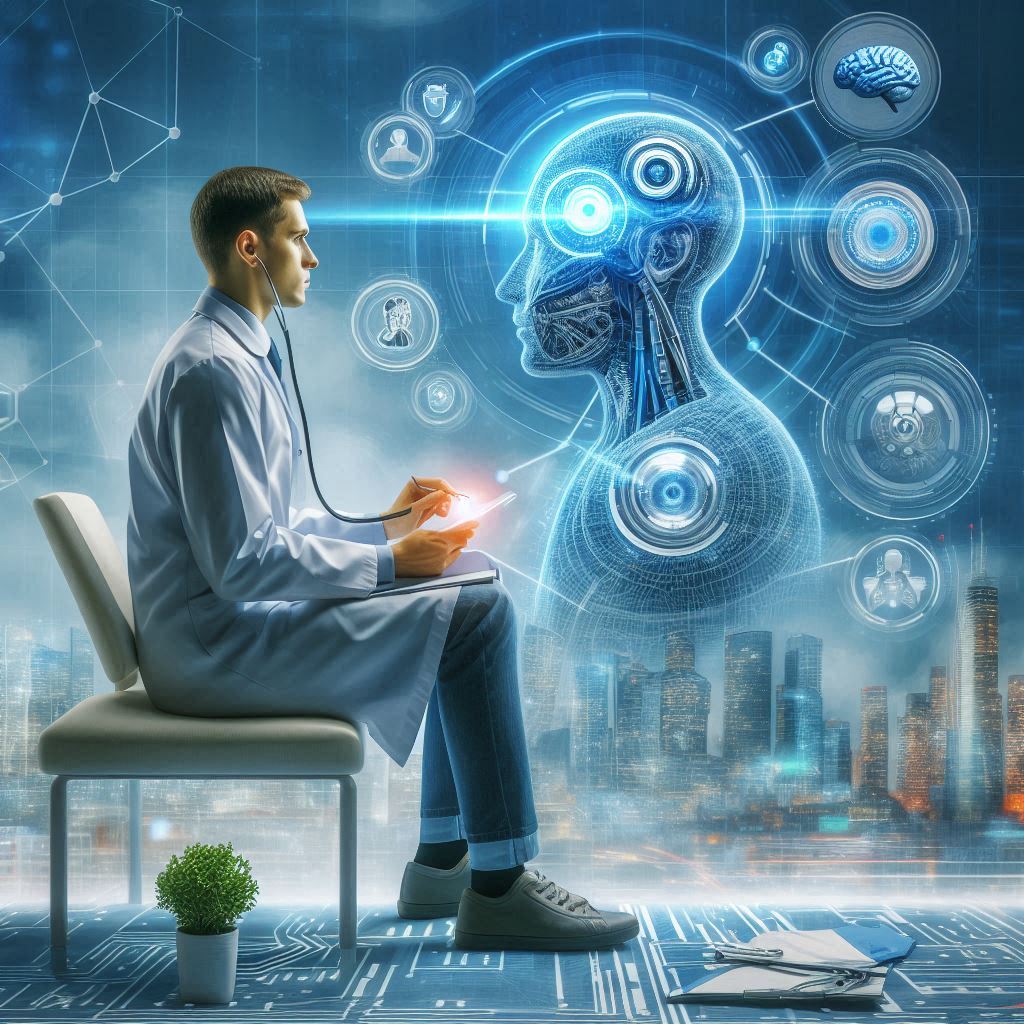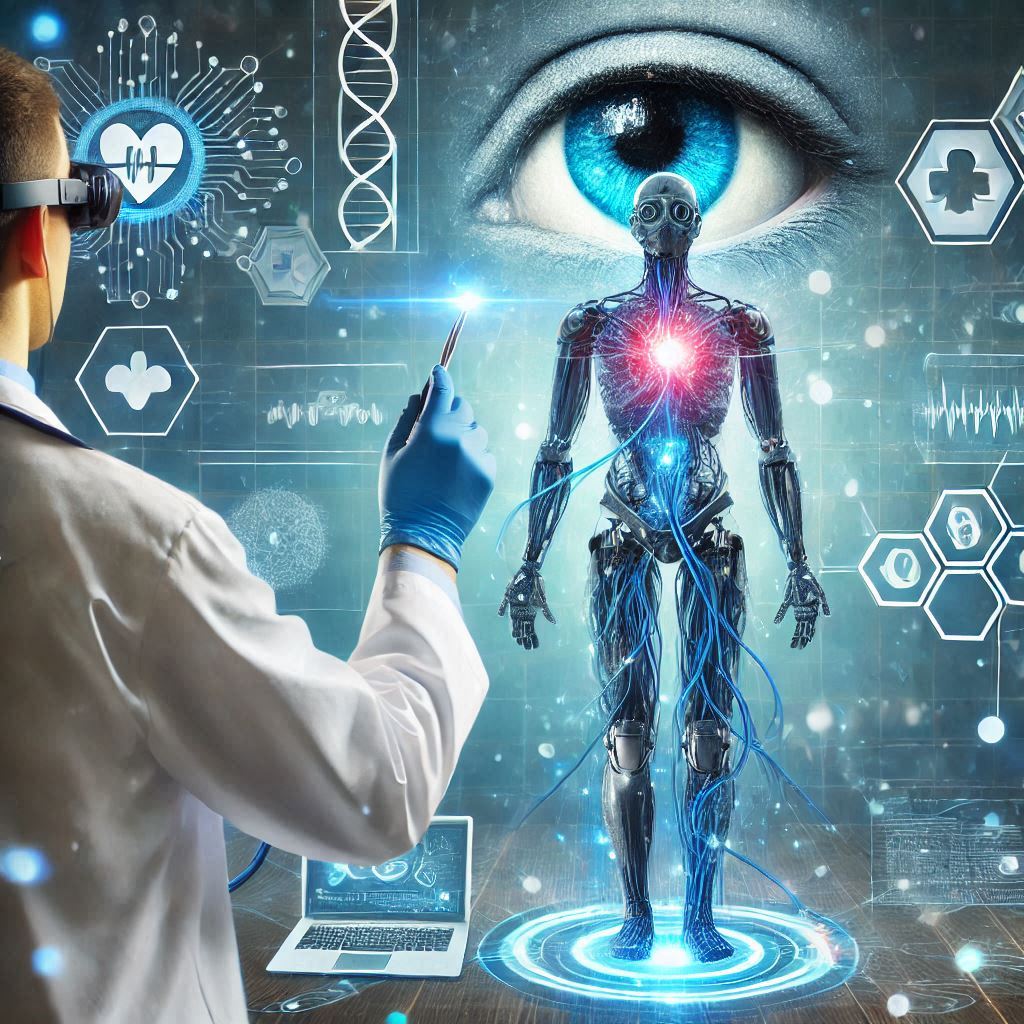Artificial Intelligence has taken critical steps in changing different enterprises, and the clinical field is no special case. From further developing diagnostics and treatment to upgrading patient consideration and functional productivity, simulated Intelligence can upset medical services. This blog discusses AI’s impact on the clinical industry, highlighting applications, benefits, challenges, and future potential.
Introduction
Artificial Intelligence, which incorporates normal language handling, and computer vision, is generally changing how medical services suppliers convey patient consideration. Overwhelmingly of information, AI can help with diagnosing illnesses, foreseeing patient results, customizing treatment designs, and mechanizing regulatory errands. As AI advances, the medical industry’s efficiency, accuracy, and accessibility are set to improve significantly.

Utilizations of Artificial Intelligence in the Clinical Industry
Artificial Intelligence applications in the Medical industry are different and expansive. Here are a portion of the key regions where AI is having a massive effect:
- Clinical Imaging and Diagnostics
High-level Imaging Techniques: Artificial Intelligence-controlled apparatuses can accurately dissect clinical pictures like X-beams, X-rays, and CT filters. Artificial Intelligence can help radiologists diagnose conditions like disease, breaks, and neurological issues more precisely and quickly by identifying examples and abnormalities that natural eyes might neglect.
Early Detection: Artificial Intelligence calculations can recognize unobtrusive changes in imaging information that might show the beginning phases of sicknesses, empowering opportune mediation and working on quiet results. For instance, artificial Intelligence driven mammography investigation can recognize bosom disease at a beginning phase, expanding the possibilities of fruitful treatment.
Prescient Analytics: Artificial Intelligence can foresee infection movement by investigating verifiable and ongoing patient information. For example, AI models can gauge the probability of a patient creating complexities after a medical procedure, permitting medical care suppliers to go to preventive lengths.
- Customized Medicine
Custom-made Treatment Plans: Artificial Intelligence can break down hereditary, clinical, and way-of-life information to customize patient treatment plans. By understanding individual varieties, computer-based Intelligence can assist specialists in endorsing more successful prescriptions and treatments with fewer side impacts.
Pharmacogenomics: Artificial Intelligence can anticipate how patients answer explicit medications given their hereditary cosmetics. This empowers medical services suppliers to pick the most proper medicine and measurements for every patient, limiting unfavourable responses and streamlining restorative results.
Designated Therapies: Artificial Intelligence-driven examination can distinguish new medication targets and foster designated treatments for conditions like disease. By investigating hereditary transformations and sub-atomic profiles, artificial Intelligence can assist with planning therapies that explicitly target disease cells while saving sound tissues.
- Drug Revelation and Development
Sped-up Medication Discovery: Artificial Intelligence can break down tremendous datasets of synthetic mixtures, natural pathways, and clinical preliminaries to recognize potential medication applicants. This speeds up the medication revelation process, decreasing the time and cost expected to put up new meds for sale to the public.
Virtual Screening: Artificial Intelligence-controlled virtual screening can anticipate the viability and security of new medication compounds before they are tried in the lab. This assists analysts with focusing on the most encouraging up-and-comers and smoothing out the improvement cycle.
Clinical Preliminary Optimization: Artificial Intelligence can enhance clinical preliminaries by recognizing reasonable members, foreseeing patient reactions, and observing preliminary advancement. This upgrades the productivity and achievement paces of clinical preliminaries, prompting quicker endorsement of new medicines.
- Virtual Well-being Assistants
Every minute of every day Persistent Support: Artificial intelligence-controlled virtual well-being colleagues can offer nonstop help to patients, addressing their inquiries, offering clinical counsel, and reminding them to take drugs. This works on quiet commitment and adherence to treatment plans.
Side effect Checkers: Artificial Intelligence-driven checkers can evaluate patients’ side effects and suggest fitting activities, such as taking care of oneself or looking for clinical consideration. This assists patients with settling on informed conclusions about their well-being and decreases pointless visits to medical services offices.
Telemedicine Integration: Virtual well-being colleagues can work with telemedicine interviews by gathering patient data, booking arrangements, and guaranteeing consistent correspondence among patients and medical services suppliers.

- Prescient Examination and Hazard Assessment
Populace Well-being Management: Artificial Intelligence can investigate populace well-being information to distinguish patterns, anticipate infection episodes, and foster designated mediations. This assists well-being specialists with apportioning assets actually and executing preventive measures.
Persistent Sickness Management: Artificial Intelligence controlled prescient investigation can screen patients with constant circumstances, like diabetes and coronary illness, and anticipate expected intricacies. This empowers medical services suppliers to mediate early and forestall hospitalizations.
Risk Stratification: Artificial Intelligence can evaluate patients’ gambling factors and separate them in light of their probability of fostering specific circumstances. This permits medical services suppliers to zero in on high-risk patients and give proactive consideration.
- Mechanical Surgery
Accuracy and Accuracy: Artificial intelligence-controlled mechanical medical procedure frameworks can help specialists carry out complex methodology more accurately and precisely. These frameworks utilize continuous information and high-level calculations to direct careful instruments, lessening the gamble of mistakes and further developing results.
Negligibly Obtrusive Procedures: Automated a medical procedure empowers insignificantly intrusive strategies that result in more modest entry points, less torment, and quicker patient recuperation times. Artificial intelligence-driven robots can perform assignments accurately in bound spaces, limiting harm to encompassing tissues.
Specialist Training: Artificial intelligence re-enactment stages can give specialists sensible preparation encounters, permitting them to rehearse strategies and refine their abilities in a virtual climate.
Advantages of Artificial Intelligence in the Clinical Industry
The mix of Artificial Intelligence in the clinical business offers various advantages for patients, medical care suppliers, and analysts:
- Further developed Precision and Efficiency
Artificial intelligence-controlled devices can dissect huge information measures rapidly and precisely, diminishing the gamble of human mistakes and working on demonstrative accuracy. This prompts quicker and more exact determinations, empowering convenient treatment and better tolerant results.
- Improved Patient Care
Artificial Intelligence can customize treatment designs and give persistent observation and support, working on understanding adherence and commitment. Virtual well-being colleagues and prescient examination engage patients in dealing with their well-being, improving general consideration quality.
- Cost Savings
Artificial intelligence-driven computerization can smooth out authoritative undertakings, streamline asset designation, and diminish functional expenses. By speeding up drug revelation and clinical preliminaries, AI additionally brings down the cost of growing new medicines and puts them up for sale to the public quicker.
- Sped-up Exploration and Innovation
Artificial Intelligence empowers analysts to break down complex datasets, distinguish new medication targets, and foster inventive treatments. This speeds up the speed of clinical examination and cultivates the revelation of new medicines for different circumstances.
Challenges and Moral Considerations
While artificial Intelligence holds incredible commitment for the clinical business, it likewise presents a few difficulties and moral contemplations that should be tended to:
- Information Protection and Security
Artificial intelligence frameworks depend on tremendous measures of patient information, raising worries about protection and security. Guaranteeing the security of delicate clinical data and consistency with information insurance guidelines is significant to maintaining patient trust.
- Predisposition and Fairness
Artificial intelligence calculations can acquire inclinations from the information they are prepared on, prompting one-sided results. Tending to these predispositions and guaranteeing reasonableness in artificial intelligence-driven medical services is fundamental to giving impartial consideration to all patients.
- Reconciliation and Interoperability
Coordinating artificial intelligence frameworks into existing medical care foundations and guaranteeing interoperability with electronic well-being records (EHRs) can be challenging. Consistent mix is important to augment the advantages of Artificial Intelligence in medical care.
- Moral Utilization of AI
Using Artificial Intelligence in medical services raises moral issues concerning navigation, responsibility, and straightforwardness. Laying out moral rules and best practices is fundamental to guaranteeing Artificial Intelligence’s capable and moral utilization in medication.
Future Possibilities of Artificial Intelligence in the Clinical Business
The eventual fate of Artificial Intelligence in the clinical business is promising, with progressions expected to drive advancement and reception. Here are a few vital patterns and improvements to watch:
- Artificial Intelligence Driven Accuracy Medication
The reconciliation of artificial Intelligence with genomics, proteomics, and other – omics advances will empower the improvement of profoundly customized medicines. Artificial Intelligence will break down complex natural information to recognize individual varieties and design treatments for every patient’s exceptional profile. - Artificial Intelligence Fuelled Telemedicine
AI will improve telemedicine by giving continuous diagnostics, virtual well-being partners, and remote checking. This will further develop admittance to medical care, especially in underserved and distant regions. - Artificial Intelligence in Emotional Wellness
AI controlled apparatuses will assume an undeniably significant part in psychological wellness care. Virtual advisors, chatbots, and prescient examination will help distinguish and oversee psychological well-being conditions, offering convenient help and mediation. - Mix of Artificial Intelligence and IoT
The mix of Artificial Intelligence and the Internet of Things (IoT) will empower persistent well-being observation and ongoing information investigation. Wearable gadgets and brilliant sensors will gather well-being information, which Artificial Intelligence will dissect to give customized experiences and suggestions. - Artificial Intelligence Improved Clinical Exploration
Artificial Intelligence will speed up clinical exploration by investigating immense datasets, distinguishing designs, and producing speculations. This will prompt the revelation of new medicines, treatments, and analytic devices.
Conclusion
Considering everything, artificial Intelligence is ready to alter the clinical business by further developing diagnostics, customizing treatment, speeding up drug disclosure, and improving patient consideration. The joining of Artificial Intelligence into medical services offers various advantages, including further developed exactness, improved patient consideration, cost reserve funds, and sped-up research. Nonetheless, addressing difficulties connected with information security, predisposition, interoperability, and moral use is fundamental to understanding the capability of artificial Intelligence in medication completely.
As artificial Intelligence keeps advancing, it will assume an undeniably significant part in forming the eventual fate of medical care. By embracing these advancements and remaining informed about their turns of events, medical care suppliers, scientists, and patients can open new doors and change the clinical business to improve things.

